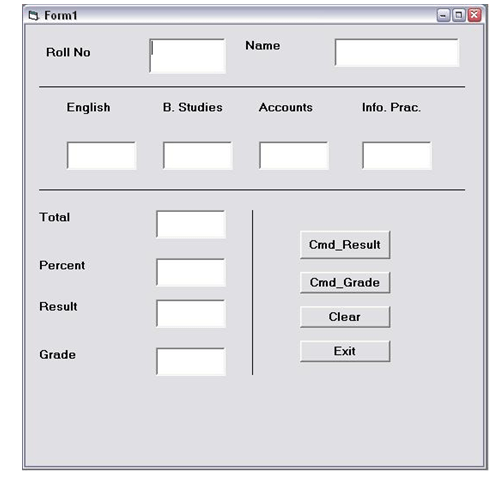Sample Paper of Information Practice for class 12, CBSE. Paper No.1
SAMPLE PAPER-2014
Information Practice
CLASS – XII MM – 70
SUBJECT – I P. Time – 3 Hrs.
Note: (i) This question paper is divided into 3 sections
(ii) Section A consists of 30 Marks.
(iii) Section B and Section C are of 20 marks.
(iv) Answer the questions after carefully..
[SECTION – A]
Q.1) Answer the following questions:
- a) Write the difference between free software & freeware
software [2]
- b) What is SDLC? Name its essential components. [2]
- Define Data Warehouse & Meta Data. [2]
- Explain Generalization & Specialization
- Identify the scope of relationship represented in the following statements and draw an Entity Relationship diagram to sketch it
“ A student can issue multiple books from the library”
“ A customer can purchase only one Motor Bike at a time from Motor Bike show room..” [2]
Q.2) Answer the following questions:
- a) What is built-in function? Write different types of built-in functions in VB. [2]
- b) Write one difference and one common characteristic between a control and a variable in VB. [2]
- c) Differentiate between ADODB project reference and ADODC in a from using suitable control. [2]
- d) What is the difference between Call by Value and Call by Reference? [2]
- e) What is procedure? Explain Function & sub procedure. [2]
Q.3) Answer the following questions:
- What is the need for normalization? Define First, Second and Third normal form. [2]
- Differentiate between Decision Control and Looping Control structure in context with PL/SQL. [2]
- What is the use of Sub Query? Which query gets executed first – The parent query or Sub Query. [2]
- What is the use of %ROWTYPE attribute? Explain with the help of example [2]
- What is trigger? Explain its types. [2]
[SECTION – B]
Q.4) Read the following case study and answer the questions that follow:
DAV organization wants to computerize their examination system. Formula and Grading Criteria given below:
Total = English + B. Studies + Accounts + Informatics Practices
Percentage = Total / 4
Percentage >= 90 Grade – A
Percentage >= 70 Grade – B
Percentage >= 50 Grade – C
Percentage >= 33 Grade – D
Percentage < 33 Grade – F
| Object Type | Object Name | Description
|
| Form | Exam | The main form object |
| Text Box | txtRNo
txtName txtEng TxtBStd txtAcct txtIP txtTotal txtPer txtRes txtGrade
|
Roll No
Name Marks of English Marks of Business Studies Marks of Accounts Marks of Informatics Pract. Total Percentage Result Grade
|
| Comand Button | cmdResult
cmdGrade cmdClear cmdExit |
Button for calculation
Button for grade Button for clear the text boxes For close |
- i) Write the code to locked the textboxes [2]
- ii) Write the code to Clear all the text boxes on clicking clear button [2]
iii) Write the code to display Total, Percentage and Result on clicking Cmd_Result command button [4]
- iv) Write the code to Grade as per the metioned criteria on clicking Cmd_Grade button. [4]
Q.5) Answer the following questions –
- a) Find the errors from the following code segment and rewrite the corrected code underlining the correction made. [2]
i = 0
For i = 1 To 5 Step
S = S + 1
Print S
Select Case (S)
2
S = S + 5
Case
S = S + 7
- b) Rewrite the following code using If… Then …. Else construct without affecting the output [2]
Sum = 0
For i = 0 To 4
For j = O To i – 1
Select Case (i + j + 1)
Case -1, 0
Sum = Sum + 1
Case 1, 2, 3
Sum = Sum + 2
Case Else
Sum = Sum + 3
End Select
Next j
Next i
Print Sum
- c) Find the output of the following code segment [2]
Dim C As Integer
C = 1
While C <= 10
Print IIf(C Mod 2, “ABCD”, “====”)
C = C + 1
Wend
[ SECTION – C]
Q.6) Read the questions given below and answer accordingly.
- a) Write the output produced by the following PL/SQL code–[2]
Begin
for i in reverse 1..10
loop
if mod (i,2) = 0 then
dbms_output.put_line (to_char( I*10));
end if ;
end loop;
end;
- b) Find the errors, if any, in the following PL-SQL code– [2]
Declare
v_empno number[4];
v_empName varchar2(20);
begin;
select empno, ename, salary into v_empno, v-ename from emp for empno = 7789;
end;
- c) Write the difference between IN and OUT parameter. [2]
- d) Write a PL-SQL code to check whether the number is
Even or Odd. [4]
Q.7) Answer the question based on the table CLUB given
below-
CLUB
| Column Name | Data Type | Width | Constraints |
| Member_No
Member_Name Address Age Type Fees |
Number
Varchar2 Varchar2 Number Varchar2 Number |
4
30 30 3 10 6,2 |
Primary Key
Not Null
>=18 |
- Write the commands to create the table CLUB including constraints
- Wrote SQL command to display the details of all the members whose type is “Permanent” and fees is more than Rs. 1000
- Write a PL/SQL procedure to delete all the rows of a particular type from the table Club where member_id to be deleted is accepted from the user.
- Write a PL/SQL code using an explicit cursor to display the details of all the “Permanent” member whose age is greater than 50. The code should also display the average membership fees of all such members. [4]
Paper Submitted By :
Name : ANAND K. SONEJI
Email : anandsoneji@rediffmail.com
Phone No. 09300668219























